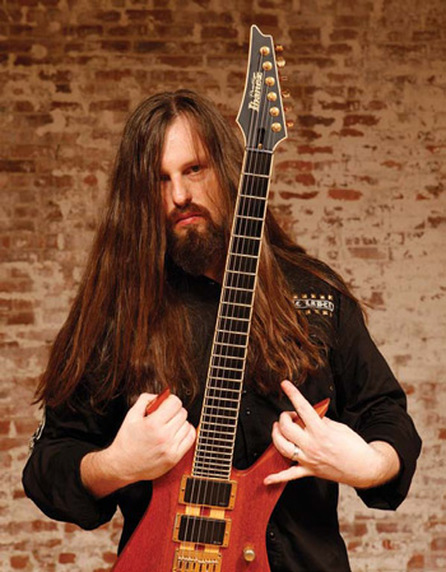Oli Herbert
of All That Remains
It doesn’t matter what music you listen to; with All That Remains, there’s a song for you. Their newest release The Order of Things (14 February 2015) caters to every flavor of rock fan. Into hardcore screamo? Listen to “No Knock.” Love melodic metal? Enjoy Phil Labonte’s clean vocals in “Divide.” Can’t get enough rock ballads? Sing along to “For You.” Fancy metalcore? “Pernicious” slams the bass drum hard enough to re-align the beating of your heart.
And if you like great guitar work, it doesn’t matter which song you choose, every single one boasts Oli Herbert and Mike Martin’s exceptional abilities to manipulate the guitar. The opening to “Bite My Tongue” gives a sample of their skill.
For those of you familiar with All That Remains, their classic sound is still accessible in The Order of Things. “The Greatest Generation” and “Victory Lap” have their infamous mesh of screaming and clean vocals, of hard-hitting speed metal and good, old-fashioned rock.
When I first got ahold of this album, I was disappointed. I wanted a carbon copy of For We Are Many, and when I didn’t, I felt let down. Now, I appreciate it in its full.
And if you like great guitar work, it doesn’t matter which song you choose, every single one boasts Oli Herbert and Mike Martin’s exceptional abilities to manipulate the guitar. The opening to “Bite My Tongue” gives a sample of their skill.
For those of you familiar with All That Remains, their classic sound is still accessible in The Order of Things. “The Greatest Generation” and “Victory Lap” have their infamous mesh of screaming and clean vocals, of hard-hitting speed metal and good, old-fashioned rock.
When I first got ahold of this album, I was disappointed. I wanted a carbon copy of For We Are Many, and when I didn’t, I felt let down. Now, I appreciate it in its full.
Speaking with lead guitarist Oli Herbert at Aftershock was an unforgettable experience. His long hair draped over his shoulders as he intently looked at me, a serious expression holding his face and freezing his eyes. He answered every question sincerely, a gentle kindness about him as he spoke of everything from classical music to taxes, from the shithole that is high school to the joy of doing what he loves most—playing music.
Herbert began playing guitar at 14, an age where he felt out of place with his peers. “I was just a lone metalhead,” Herbert remembered. “Instead of going off to parties, I’d stay on my own and practice.” His parents recognized early on his dedication to the guitar, and supported his musical ventures.
“I had my first band, we played in the Battle of the Bands [on the] last day of school [my] senior year,” he said. “[We] won third place and $25. My first gig I got paid.” Now that’s a statement most musicians never get to say.
After high school, Herbert attended college and earned a Bachelor’s in Music Composition. “Understanding classical music, jazz music, [and] how things are built—I think it’s…extremely important for a guy who does a lot of songwriting for a band, like myself,” he told me. His background in classical and jazz composition has proven an asset, especially for The Order of Things.
“I went back to my roots for this album,” explained Herbert. “I went back to before I really liked heavy metal… I went, ‘What made me want to start playing?’ I feel like that fun vibe…made it onto the record.”
Herbert began playing guitar at 14, an age where he felt out of place with his peers. “I was just a lone metalhead,” Herbert remembered. “Instead of going off to parties, I’d stay on my own and practice.” His parents recognized early on his dedication to the guitar, and supported his musical ventures.
“I had my first band, we played in the Battle of the Bands [on the] last day of school [my] senior year,” he said. “[We] won third place and $25. My first gig I got paid.” Now that’s a statement most musicians never get to say.
After high school, Herbert attended college and earned a Bachelor’s in Music Composition. “Understanding classical music, jazz music, [and] how things are built—I think it’s…extremely important for a guy who does a lot of songwriting for a band, like myself,” he told me. His background in classical and jazz composition has proven an asset, especially for The Order of Things.
“I went back to my roots for this album,” explained Herbert. “I went back to before I really liked heavy metal… I went, ‘What made me want to start playing?’ I feel like that fun vibe…made it onto the record.”
To sustain himself through college and the early stages of All That Remains, Herbert taught guitar lessons, and still does when he finds the time.
“It’s fun to watch someone come in with a question and they’re struggling, they think they’ll never be able to overcome a certain hurdle, and I show them the most straightforward, easiest route to accomplishing that,” Herbert explained. He cherishes the look on his students’ faces when they begin to understand or surmount an obstacle. He continued, “I like to see people happy. I like to see people achieve something.”
This philosophy of relishing the excitement of others translates to his on-stage performance as well.
“I think one of the greatest joys of doing this is that I’m out there and playing and people are hopefully receptive and happy about it,” Herbert said. “I’m out there doing what I love; they’re there because they want to be. It’s not like I’m an IRS agent. They’re paying to see a show and I’m glad to entertain.”
Teaching guitar worked well for Herbert for several years, until ATR began touring a lot more. “I had to quit the teaching job at the store I was at because I wasn’t around enough and we were making such little money on tour,” he explained.
In fact, after one of ATR’s first tours, Herbert came back with only $200 to his name. “It sucked,” he said. “I had to make a hard decision: Do I stay with the band and hope it gets better? Or do I go back to teaching [full time]—which is a sure thing—but always wonder what could have happened?”
After having successfully released seven albums and travelled all over the world, Herbert is glad with the choice he made, but at the time, he felt unsure where that decision would take him. Now, Herbert says, “I wouldn’t change it for anything.”
“It’s fun to watch someone come in with a question and they’re struggling, they think they’ll never be able to overcome a certain hurdle, and I show them the most straightforward, easiest route to accomplishing that,” Herbert explained. He cherishes the look on his students’ faces when they begin to understand or surmount an obstacle. He continued, “I like to see people happy. I like to see people achieve something.”
This philosophy of relishing the excitement of others translates to his on-stage performance as well.
“I think one of the greatest joys of doing this is that I’m out there and playing and people are hopefully receptive and happy about it,” Herbert said. “I’m out there doing what I love; they’re there because they want to be. It’s not like I’m an IRS agent. They’re paying to see a show and I’m glad to entertain.”
Teaching guitar worked well for Herbert for several years, until ATR began touring a lot more. “I had to quit the teaching job at the store I was at because I wasn’t around enough and we were making such little money on tour,” he explained.
In fact, after one of ATR’s first tours, Herbert came back with only $200 to his name. “It sucked,” he said. “I had to make a hard decision: Do I stay with the band and hope it gets better? Or do I go back to teaching [full time]—which is a sure thing—but always wonder what could have happened?”
After having successfully released seven albums and travelled all over the world, Herbert is glad with the choice he made, but at the time, he felt unsure where that decision would take him. Now, Herbert says, “I wouldn’t change it for anything.”
Herbert dedicates himself to constantly performing at a high level. “I always perform sober,” he stated. “Every time I perform, I know every single mistake that I made that night... I don’t let it destroy me if I miss a couple notes, but the next day in the practice room, I [think], ‘This is what needs to happen, this is what you messed up, let’s work on it…’ If I see improvement on that part, I’m like, ‘All right!’”
Herbert strives for what he calls “tangible results,” and will sometimes spend three hours locked in a room working on one lick.
This intense work pays off, as Herbert is one of the most overlooked guitarists in metal today. His energy onstage electrifies the crowds as they drool over his fast fingers and addicting riffs. He ranks in the top five most under-appreciated guitarists of today along with Cord Pool from Texas Hippie Coalition.
Oli Herbert’s dedication is apparent in everything he does, from his interviews to his performances and every movement in between, he is one hundred percent devoted to All That Remains and everything it stands for.
Herbert strives for what he calls “tangible results,” and will sometimes spend three hours locked in a room working on one lick.
This intense work pays off, as Herbert is one of the most overlooked guitarists in metal today. His energy onstage electrifies the crowds as they drool over his fast fingers and addicting riffs. He ranks in the top five most under-appreciated guitarists of today along with Cord Pool from Texas Hippie Coalition.
Oli Herbert’s dedication is apparent in everything he does, from his interviews to his performances and every movement in between, he is one hundred percent devoted to All That Remains and everything it stands for.
| Zoe Adler is a music journalist from Long Beach, California. Besides her website, which is her pride and joy, she works with the GRAMMY Foundation and the Long Beach Independent. Additionally, Ms. Adler is a musician, spending half of her time playing the flute, piccolo, trombone, and marching baritone. She has been with TeenView Music since the very start and hopes to make something of it in the future. |


 RSS Feed
RSS Feed
